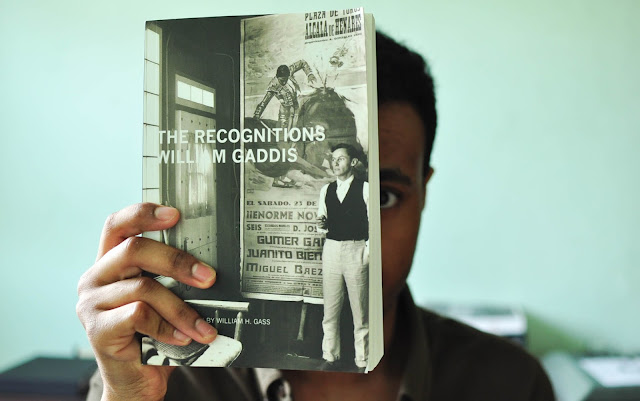
This is the second entry in my ‘I really like_’ posts, following from the previous on Joyce, I’d like to make this one more of an intro or something about a writer many of you may be unaware of. William Gaddis’ work is often associated with Pynchon, but this triage is completely one-dimensional. Gaddis himself said he didn’t enjoy or understand Pynchon’s writing. Gaddis can be distinguished to have united Faulkner’s modernist proclivities (e.g. neutral and fractured literary styles) and Pynchon’s post-modernism (he also sequentially fits the criteria, writing exactly between the two). Gaddis is also sorta like America’s answer to Kafka; the former had a day job at a lawfirm filing documents his entire life. Somewhat cliché, but Gaddis abhorred the literary culture back then, and only ever acknowledged T.S. Eliot as his favorite writer.
In JR, his sophomore novel (which personally did something no other book has done, which I’ll explore later), he incorporated the vernacular of western bureaucracy so accurately that 50% of the book is paraphrase. He has been rumored to have made notes quoting his colleagues and implementing it into his book.
I think JR won the National Book Award, but Gaddis is still ‘underrated’ in the sense that only neurotics and academics read him in modern day. The award was also dished out hesitantly, similar to Gravity’s Rainbow, by a judging board whom some of which didn’t actually read the book. Gaddis only wrote four novels, and both the penultimate and final books were slight knock-offs of his first two.

The Recognitions, his first book, also left me speechless, and this is how: Gaddis took advantage the reader’s tendency to overlook things, or the casual beleif that the author’s foremost concern was to ‘look after’ the reader. He was mindful of how ‘fictional realism’ is constructed in the reader’s mind, and intently fucked with it. Jonathan Franzen, and other contemporary social-realists, don’t like that shit (and I can understand why), but if you like to be fucked with, Gaddis is your man.
Here are some examples of his method:
In The Recognitions, the characters names slowly become interchangeable. Gaddis purposely introduces other characters with almost identical names (Esme, Elise, Elsy, Elly, Elyse, etc.) to confuse the reader. But there is a surreal component to this: the story is about pastiche and the death of ‘the original,’ (a big deal back then, think Warhol) and so the characters ‘carica-turise’ themselves as being copies of one another. Gaddis also does a lot of funny things, like halfway through the book, the main character disappears and is never mentioned again. The subordinate characters go on and struggle for position as the main character. The book is about a painter who makes more money forging painting than painting his own, though that’s a really shallow description of the book. It’s really about the capacity of ‘character’ in a novel, and the artifice of its rendering. It’s also a haunting love story.

JR is 700 pages of un-cited dialog (absent from “said John,” “replied Lisa,” etc.) The reader basically has to ‘dive in’ and, like some archeologist, retro-actively create a logical world using a meager set of clues. The more the reader investigates, the more he/she discovers how intricate the novel was written, and how Gaddis leaves not only the right clues, but at the right time. So the ‘writing’ is not actually on the paper, it’s 80% in the reader’s mind. And, yes, he really fucks with you: there’s a scene where person A and person B are talking, and person A interrupts and says, “Oh, person C!” followed by descriptions which lead the reader to believe person C rang the door bell—and the reader bases the next 50pgs on that premise. 150 pages later, the reader realizes that person C came down the stairwell when person A says “Oh, person C,” and the person at the door was actually person D, which inverts the entire preceding narrative. Gaddis said he got the idea from T.S. Eliot’s play “The Cocktail Party,” in which a lot of the actor’s dialog takes place off-stage.
He also exploits the inherent fragmented perception that comes from reading fiction, how ‘truth’ (even fictional truth) is impossible. There’s a scene where a man looks in a rearview mirror from a taxi and sees a bouquet of flowers bouncing. It’s described in such a lyrical and memorable way, that it’s embedded in the reader’s memory like some archived signifier, some mental database which glue timelines together. Then some 200 pages later, another character in the book (in the context of the day the taxi ride took place) sees a penny on the ground and attempts numerous times to bend down and pick it up. And he’s holding a bouquet of flowers. These are just one of a myriad of moments when I was like, “holy fuck.”
This post is getting too long. I’ll finish quickly: If you want to be utterly mind fucked for a month straight, and carry the reading experience in your bone marrow forever, read The Recognitions or JR, just get a pen and pad of paper to take down notes. Flow charts and diagrams won’t hurt too.



I've never even considered reading Gaddis before. I don't know why. Now I am considering it.
ReplyDeletei'll give it a look. good post
ReplyDeletethank you idris, this was interesting and pleasant to read
ReplyDeleteJR is a fucking AMAZING book. i spent one week of a summer reading it when i was a teenager. that's all i did, nothing else, read JR.
ReplyDeleteone week, impressive.
Deleteit took me two months
"Gaddis only wrote four novels, and both the penultimate and final books were slight knock-offs of his first two."
ReplyDeleteWhich of his last three do you not consider a book, Agape Agape? Since it was more a book about a guy writing a book about the same topic Gaddis was to have written a book about. But in that case you can't really call most of Markson's work "books".
This comment rubs me wrong. A Frolic of His Own was genius, A.A. stands alone and was an impressive end-stone to a focused career for reasons I don't have time to go into at the moment. Carpenter's Gothic... yeah, it was OK. Certainly not an "inconsequential knock-off", but his low(er) point for me.
Referring to Frolic of His Own in particular as "knock-off" makes my eye twitch a little.
Deletedont take it personally. idris often posts things without adequately thinking them through beforehand...
which is part of his appeal for me.
M: Barry is right, I don't think things thru. Agape, agape was published posthumously, and i don't know, that always makes me feel like the writer had 'no say,' and i don't trust editors/publishing houses trying to make a buck with a book that the author might not want published.
ReplyDeleteit's cool that you liked AFOHO and AA, that's what makes humans so complex, that we each have our own brain, and what i wrote came from my brain, and what you wrote came from your brain.
"and what i wrote came from my brain, and what you wrote came from your brain."
DeleteOK, cool. Can you explain why you find Frolic an inconsequential knock-off? Winning a National Book Award may not necessarily de-facto prove a book's worth, but it does kind of set a precedent that, should you be inclined to speak against it, needs to be addressed a little more deeply than with a couple of words. Stylistically it was an entirely different novel, and it addressed a different sector of American life than any of his others. I'm just curious how you came to this conclusion.
i enjoyed this post
ReplyDeletei thought 'interesting' sometimes
idris:
ReplyDeletei love you
M., i read 50pgs into AFOHO and felt, formally, he was doing exactly the same thing as JR, with the crazy unquoted talk and all. maybe from pg 51 and on it was different, but i flipped thru the book to check, and it 'looked' the same. i know, i'm horrible.
ReplyDeletecarpenter's gothic was okay.
thank you everyone else who responded positively about this post.
it's friday, i'm in love.
OK. I think that's why out of all of them Carpenter's is the only one I could take or leave. I don't know if I can say its scope fits all that well with the rest.
ReplyDeleteWell, I'd give it another go, there's some interesting stylistic things he does, using court "documents" as narrative tool etc. Depends if you're reading it for the style or for the content. I find it a hilarious take on our legal system. I think it's absolutely hilarious and engaging.
re: AA, I can understand that as I tend not to feel awesome about posthumous publications myself, but this:
"But it was also the case that Gaddis used much of the material directly or indirectly in his novels, and by 1989, had decided that the history, for which he had by then accumulated material over a period of nearly 50 years, was 'over-researched' and would never be published. So it was perhaps surprising that for his last work, he decided to return to the project. He spent two years working on the history, but then decided to re-cast it as a work of fiction. Agapē Agape was completed shortly before his death in 1998, and finally published in 2002."
(from http://www.williamgaddis.org/a...
among other tidbits I've read make me think that if he were alive it would have appeared in much the same manner.
I find it an almost crushing end note to his career. He basically laid out a very hard line aesthetic in The Recognitions he felt he failed (I definitely read the narrator of AA as Gaddis himself, though there's been some debate on the gaddis-l):
"Age withering arrogant youth and worse, the works of an arrogant youth and the book I wrote then, my first book, it's become my enemy, o Dio, odium, the rage and energy and boundless excitement the only reality where the work that's become my enemy got done and the only refuge from the hallucination that's everything out there is the greater one that transforms you good God, Pozdnyshev, those words that Levochka gave you to transform the whol thing when "music carries you off into another state of being that's not your own, of feeling things you don't really feel, of understanding thing you don't really understand, of being able to do things you aren't really able to do" yes, that transforms that transfigures you yourself into the self who can do more! That was Youth with its reckless exuberance when all things were possible pursued by Age where we are now, looking back at what we destroyed, what we tore away from that self who could do more, and its work that's become my enemy because that's what I can tell you about, that Youth who could do anything." (last lines of AA)
It's almost saying that by its mere existence AA is a failure, but a completely self-aware failure that's devastating for its self-awareness.
thank you for getting 'deep into this' M.
Deleteyou prove that Gaddis fans are nutbags.
i like that.
A great post, Idris. I love Gaddis.
ReplyDeleteIdris,
ReplyDeleteI really enjoyed this post and would love to read the other entries in this "I like __" series. Especially if the writers being spotlighted were historical rather than contemporary. This would be a neat way to discuss literary antecedents.
I first came to Gaddis through AFOHO at a time when I really needed the kind of inspiration it offered (i.e. an entire text of unattributed dialogue). I never got around to reading TR, but you've peaked my interest.
Anyways, just wanted to say thanks for your thoughtful post on an author that doesn't seem to get talked about much.